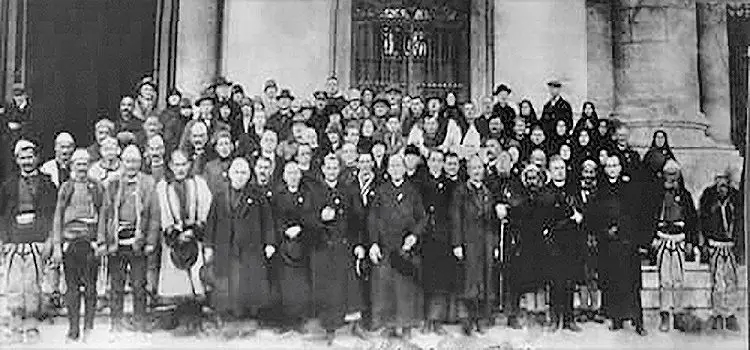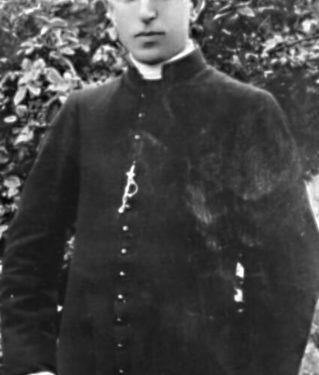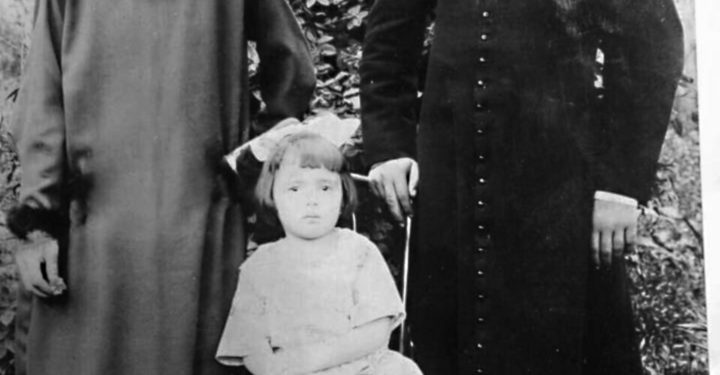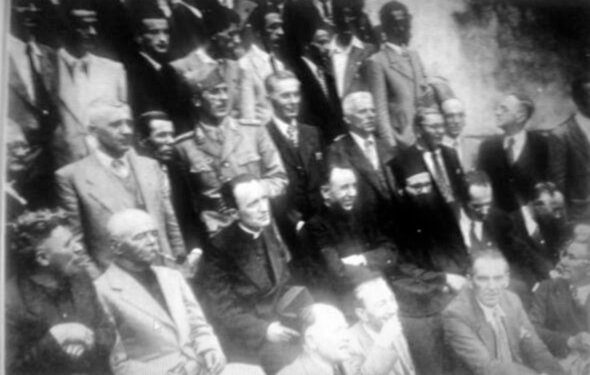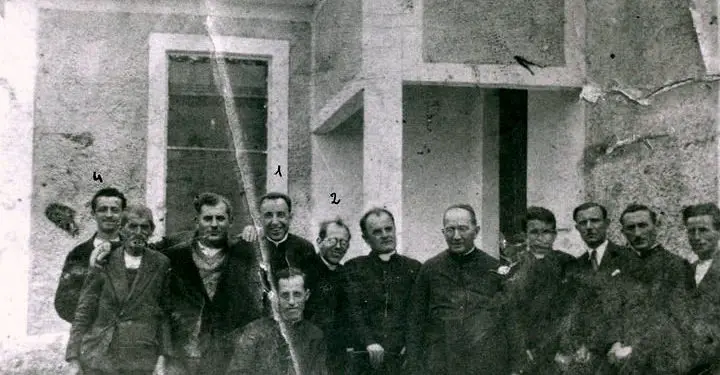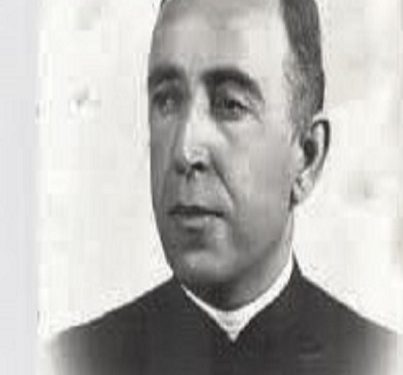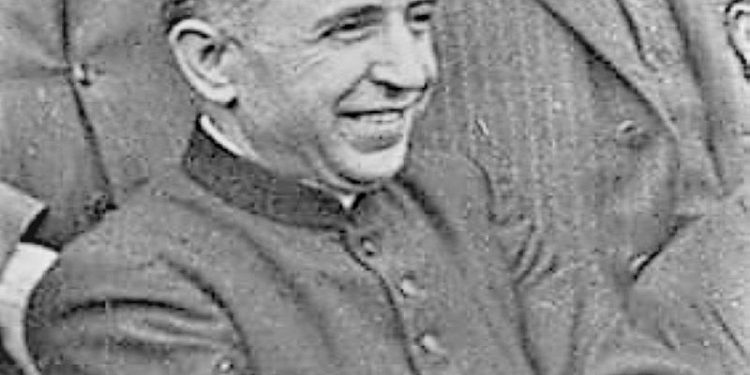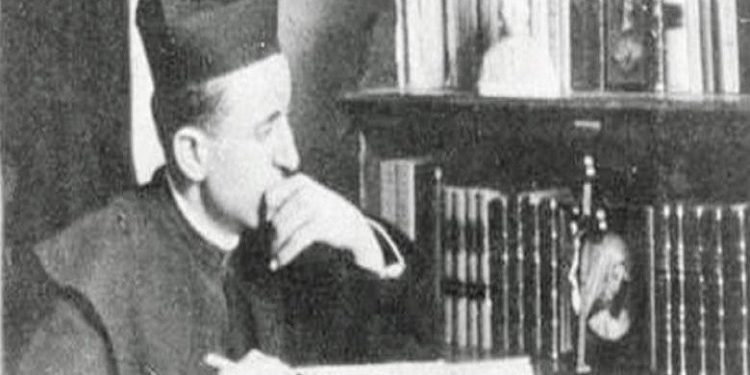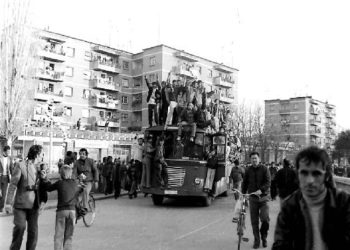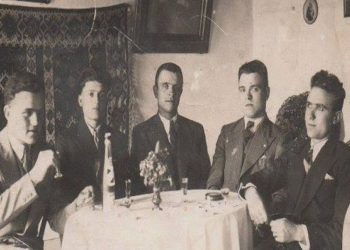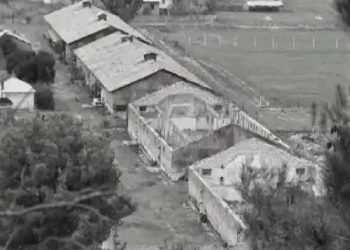NIKOLLË LOKA
Av. ALFDRED DUKA
NIKOLIN KURTI
Part twenty one
-Continuing the tradition of native Catholic clergy –
Cooperation for the state and only in its interest
While serving the sentence
I sanction the arrest
Attorney General
Lefter Goga
Tirana on 5-VI-1970
DECISION
For arrest
I, the investigator of the Ministry of Internal Affairs, Llambi Gegeni, after studying the materials at the charge of Shtjefën Kurti, the son of Jaku and Katerina, born in 1898, born in Prizren and resident of Gurëz in the Krujë district, with a higher education- Theology, unmarried, unorganized, sentenced to 20 years for hostile activity, rich class, (former parish priest), with Albanian citizenship and nationality.
I found:
That the aforementioned has agitated and propagated for the undermining and weakening of popular power, this crime provided for by Article 73/I of the Criminal Code. His hostile activity is proven by the materials attached to this decision. Taking into account that his being free may lead to his avoidance before the investigation and court bodies, guided by articles 145 and 157 of the Criminal Code. Criminal.
I decided to arrest Shtjefan Kurti.
This decision should be notified to the aforementioned, taking his signature.
The investigator
Llambi Gegani
The decision was notified to me on 11-6-970
Shtjefën Kurti
DECISION
“On admission as a defendant”
In Tirana, on 10-II-1971. I, the investigator of the Ministry of Internal Affairs, Iljaz Haxhiaj, have studied the investigative materials in charge of the defendant Shtjefën Kurti.
I found:
That the defendant Shtjefën Kurti, in cooperation with the defendants Mark (Bardhok) Marku, Agustin Preçi, Pjetër Biba, Fran Noci, Zef Nishi and before others, has conducted hostile conversations against the popular power.
The defendant, during his hostile activity, starting as early as 1968, incited the defendants Mark (Bardhok) Marku, Pjetër Biba, Agustin Preçi, Fran Noci and Zef Nishi to commit acts of arrest to the detriment of the economy of the agricultural cooperative of the town of Gurëz in the district of Kruja, in order to achieve its destruction. In order to achieve this goal, I have instructed the most servile defendants to continue stealing to the detriment of the agricultural cooperative, to commit various damages during the works, to arouse discontent among the members so that they do not participate in the work, aiming thus in the reduction of the yields, the reduction of the value of the working day and as a result the members rise up for the destruction of the agricultural cooperative.
As a result of the incitements made by the defendant Shtjefën Kurti, the other defendants committed thefts and damaged the cooperative economy during work. In this way, the defendant Shtjefën Kurti, as the main instigator and inspirer of this activity, has committed the crime provided for by Article 72 in combination with Article 12 of the Criminal Code.
For the above and in support of Article 129-1930 of the Criminal Procedure Code.
I decided:
That Shtjefën Kurti should also be charged with the crime provided by Article 72 in combination with Article 12 of the Criminal Code. The decision shall be notified to the defendant by obtaining his signature.
The investigator
Ilajz Haxhiaj
The decision was announced today on 10/II/1971
the defendant (Shtjefen Kurti)
Record
In Tirana, on June 12, 1970. I, Iljaz Haxhiaj, an investigator at the Ministry of Internal Affairs, asked the arrested Shtjefën Kurti
Question: Tell us your biography?
Answer: My name is Shtjefën Kurti, the son of Jak and Katerina, I was born on December 24, 1898 in Prizren-Yugoslavia and I live in Gurëz village of Krujë district, with Albanian nationality and citizenship, with a high education in theology, wealthy commercial class, recently a worker in the Gurëzit agricultural cooperative, convicted once in 1946, with 20 years of imprisonment by the Military Court of the Tirana Garrison, for activity against the government, unmarried, I was arrested on June 11, 1970.
From the time of Turkey and until the time of the first Serbia, my father was engaged in the trade of grains and other foodstuffs, thereby securing a good fortune. After the arrival of the first Serbia in Kosovo, he fell economically, because the trade was taken over by the Serbs, so he became a servant of the Municipality in Ferizaj.
I completed primary school in Ferizaj, while I completed high school with Philosophy in the city of Shkodra in 1908, at the Jesuit school. In Shkodër, to continue school, I was sent by the Archbishop of Skopje. In the autumn of 1918, I entered the State University of Innsburg in Austria, for Theology. I continued there for a year, and then after the First World War ended, I went to Italy to continue the same lessons. In Rome, I finished the school of Theology. After I finished school, I returned to Yugoslavia as a priest, where I stayed in Skopje as Secretary of the Archbishopric for 5-6 months and since the Archbishop was transferred to Shkodër, I refused to continue with him and stayed in Yugoslavia.
In the Subprefecture of Gjakova, in the village of Novosella, I was assigned as a parish priest and I continued as such until 1930, when on January 2, 1930, I crossed the border illegally to Albania. In the same year, I received Albanian citizenship, since the population census was taking place, but I also kept Yugoslavian citizenship, since I had not moved. At first, I got a job as a parish priest in Shnaprende, Kruja district. In 1932, parish priest in Gurëz. In April 1938, I was appointed parish priest in Tirana, where I stayed until October 27, 1946, and the date on which I was arrested. In April 1947, I was sentenced to 20 years of imprisonment, by the Military Court of the Tirana Garrison, for activity against popular power. I served my sentence in Burrell prison until May 2, 1963, when I was released, taking advantage of part of the time, from amnesties.
After I was released from prison, I settled in Gurëz village. Until the closing of the churches, I have been engaged in private religious work. After this time, I started working at the Gurëz agricultural cooperative. On June 11, 1970, I was arrested.
After I read the process and saw that my statements were written correctly, I signed it.
The investigator The arrested
Iljaz Haxhiaj Shtjefen Kurti
Record
In Tirana, on June 13, 1970. I, Iljas Haxhiaj, an investigator in the Ministry of Internal Affairs, assisted by my friend Koço Josifi, asked the defendant Shtjefën Jak Kurti.
Question: You heard the charge against you, do you understand?
Answer: Yes, I heard and understood the accusation against me. I am accused of hostile activities that I carried out against the popular government.
Question: Can you give us an explanation about the charge you were notified of?
Answer: I fully accept the charge that you informed me of, and I have the following explanations regarding it: In 1963, I was released from prison, where I had been sentenced to 20 years of imprisonment, for hostile activity that I had developed against the people’s power and in favor of the Italian discovery and his French. After leaving prison, I went to Gurëz village in Kruje district. During the meetings I had with Zef Bici and Mark Dushin, they informed me about the decisions and changes made by the Council, which they had heard from listening to the Vatican radio station and the Italian radio station. Together with these two, we discussed the news they had heard from Vatican Radio.
In addition, Zef Bici gave me some Italian magazines at that time, which after I read them, I returned them. In conversations with Mark Dushin, he also spoke to me about the issue of the church statute, about the talks and discussions that were held by church clergy, about the work of the statute. Marku told me that one thing was interesting, according to the State Security bodies, they find out everything that was discussed on our side regarding the statute, definitely, said Marku. Security has its man inside. In the continuation of the conversation, I told Mark that, why didn’t you ask for the release of the hostages from prison? Marku told me that we asked for this job, but we were not told anything.
During my time in Gurëz, in the conversations I had with various people, whose names I do not remember now, I told them that we were surprised that it has been twenty-six years since Albania was liberated and it is still not being resolved by this government the question of bread, the people remained calling for bread, bread. I said that it is not fair that the young and the old are not rewarded equally, considering that both parties work and pour energy. I said that it is not fair at all, as it is done by this government, that the peasant, who produces wheat, meat, milk, butter and other food items, does not have food for himself, since all these are taken from him of the state and the city is supplied.
After I read the process and saw that my statements were written correctly, I signed it.
The investigator The arrested
Iljaz Haxhiaj Shtjefen Kurti
The assistant
Koço Josif
Verbal process
In Tirana on June 17, 1970. I, Ilias Haxhiaj, an investigator at the Ministry of Internal Affairs, asked the defendant Shtjefën Kurti
Question: Do you continue to explain to us about the charge that has been brought to your attention?
Answer: In 1963 or 1964, after I got out of prison, I came to Tirana and met with Zef Bic, to whom I asked for my books that I had left in the church doors in Tirana since 1946, before to be arrested at that time and that after my arrest, the head of that office that I was, became Zef Bici. Zefi gave me the books and along with these he had also given me some of his books, among these books, Zefi also gave me a book whose content was against communism. As far as I remember, this book was titled “God of Materialism”.
Zef Bicit told me about this book, it is a book that scientifically refutes the doctrine of communism with arguments; but takes it, said Zefi, and read it. This book was written by a Jesuit, whose name I do not remember but he was an Italian citizen, written in the Italian language and printed in Italy. I read the book and since I liked it a lot, I made a summary in the Albanian language, writing about thirty pages of notebooks with ink. After two months, I returned the book to Zef Bici.
For the translation of the book, I asked Zefi for an Italian-Albanian dictionary by Kordinjano and he, as he told me, bought this dictionary for a thousand old ALL and gave it to me. I did not tell Zefi that I was looking for the dictionary for the translation of this book or, as I had intended, for the translation of the life of Christ. At the time when I returned the book to Zef Bicit, he told me that he himself had translated this book into Albanian, but had not published it. Zefi did not tell me how he got hold of this book.
Later, after I had translated the summary of the book, in a meeting I had with Mark Dushin, when he was a parish priest in Delbnisht, Kruja, he told me that he had heard from Zef Bici about the summary of the book that he had done for him. . Mark begged me to give it to him to read. I told him that’s how it is, I made a summary of this book, I took it to Mark in Delbnisht, and he kept it and later did not return it to me.
As I said above, the content of the book was completely against communism, it was against materialism, with the argument that life did not come by itself, as the communists say, but that God gave it.
After the arrest of Zef Bic and others, I, fearing that the authorities would confiscate my books, among which I also had books with content against communism, decided to burn them. Thus, I separated the books that had this content from the other books and gave them to Mark (Bardhok) Mark from Gurëzi to be burned in a bundle, ordering this to be burned and no one would know. I later asked Mark if he had burned the books, and he said yes. I did not burn these books myself, because at that time, I lived in a room next to the agricultural warehouse in… And I was afraid that the warehouse would catch fire. I didn’t have either the spurs or the chimney for fire. Later, in the cooperative’s furnace, I burned all the other books.
In the meetings I had with Zef Bici and Mark Dushin, I told them that I had suffered a lot in prison and at the same time I thanked them for the help these two had given me for the entire time I was in prison, who sent me every month from one thousand old ALL.
After I read the process and saw that my statements were written correctly, I signed it.
The investigator The arrested
Iljaz Haxhiaj Shtjefën Kurti
Verbal process
In Tirana, on June 21, 1970. I, Iljas Haxhiaj, an investigator at the Ministry of Internal Affairs, asked the defendant Shtjefë Kurti.
Question: Do you continue to give us explanations regarding the hostile activity that you developed against the people’s power?
Answer: From the end of 1969, or in January of 1970, I do not remember the exact time; it was winter, in the room where I live, in the house of Shukurt Biba, one Sunday we organized a dinner, where we gathered, Pjeter Biba, Mark (Bardhok) Marku and Zef Nishi. There was also Prengë Biba and Peter’s eldest daughter-Dava Biba. These two helped prepare dinner. Before this dinner took place, a couple of days ago, someone came to my house and expressed the idea of having a dinner together. I said: I agree to do this. So, on Sunday evening, we gathered in the room where I lived, all the people I mentioned above. Bardhok brought a chicken, a liter of brandy and a quantity of cheese; while I, in addition to the other food that was prepared, boiled some eggs with rennet. We, the four men, took a place at the table in one corner of the room, while Prena and Dava stood near the stove, but Prena also drank a glass of brandy.
The dinner lasted for about two hours and during this time, we had these conversations against the government: One of the people who now, I don’t remember who specifically, Pjetri, Bardhoku or Zefi said to me: When you were young, you passed well, you have enjoyed your life, while we, in this regime, are not enjoying our youth, we are getting very tired, even for a living. In this case, after this conversation, I took the floor and started to talk to them about the life I had spent in the previous regimes; so I told you that this is true that I have lived a good life in the past regimes and I have enjoyed life, but now, in this power, I am suffering a lot. I reminded you of the words of the Italian poet – Dante, who said: “There is no greater suffering than remembering the beautiful days in misery.”
So, with this widow apparently I had led a good life in the past, now I was suffering. Also, between other conversations about the economic situation of the agricultural cooperative, which everyone presented to us as bad, Mark (Bardhok) Marku, turned to me and asked me how long this situation will continue? I answered that you should not be upset, addressing the three of you, that time is the healer of everything, you must be patient that you, who are young, have good days to see, after these have grown old and died. leaders who are today at the head of the Party and the state and that other leaders who will come will have softer thoughts and thus the political situation will improve and change in our favor, then the churches will be opened again . In this case, Bardhoku told me that we now want to enjoy freedom and life. The same words were said by Zef Nishi and Pjetër Biba. Also, when these three told me that in agricultural cooperatives we are suffering a lot and we are not satisfied with bread, I told you that the Albanian people have always called for bread, bread, but now in this cooperative system, the people are even worse.
In continuation of the talks, about the economic situation of the country, which we presented as bad and that the people were suffering for their bread, I told them how bad this political system is in Albania, today we are bad, tomorrow we will be even worse. I also told them that every Sunday I listen to Radio Rome and the mass that is given there. When I hear this, I said to them, I marvel greatly, for the poor, we who are not free from this power, to perform religious services and make the cross. Likewise, this night, I have told you about the news that I was hearing from the radio station “Voice of America”, Moscow, Italy, the Vatican, about the wars that were taking place in the world, about the efforts of different parties in Italy to take power, how and for coalitions between parties and others.
After reading the process and seeing that my statements are written correctly, I sign it. Memorie.al
The investigator The arrested
Iljaz Haxhiaj Shtjefën Kurti




